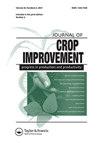粗糙木霉SH16 42 kDa几丁质酶基因在花生中的过表达
IF 1.5
Q3 AGRONOMY
引用次数: 1
摘要
摘要在热带和亚热带地区,花生是一种重要的豆科作物,广泛用于食用和食用油。然而,它们极易受到各种植物病原体的影响,特别是土壤传播的真菌,这导致产量低,种子质量差。本研究旨在花生中表达3个曲霉SH16 42 kDa几丁质酶编码基因,以提高花生对某些土传真菌的抗性。Chi42是一种合成的无内含子野生型基因,而syncodChi42-1和syncodChi42-2是花生密码子优化的合成基因。这些基因通过农杆菌介导的转化被引入到当地的花生品系中。对转基因花生品系的分析表明,syncodChi42-1和syncodChi42-2基因的几丁质酶特异性活性分别比野生型基因高约1.2倍和1.4倍。转基因花生植株对土壤病原菌罗尔夫菌核菌也表现出抗真菌活性。用这两个合成基因转化的花生品系比用野生型基因转化的花生品系具有更强的抗真菌活性,这表明它们可以作为抗植物病原真菌的新型花生品系。本文章由计算机程序翻译,如有差异,请以英文原文为准。
Overexpression of 42 kDa chitinase genes from Trichoderma asperellum SH16 in peanut (Arachis hypogaea)
ABSTRACT In tropical and subtropical areas, peanuts are a very important legume crop that is widely cultivated for food and cooking oil. They are, however, extremely susceptible to a wide range of phytopathogens, particularly soil-borne fungi, which result in low yields and poor seed quality. This study aimed to express three Trichoderma asperellum SH16 42 kDa chitinase-encoding genes in peanut to improve their resistance to some soil-borne fungi. Chi42 is a synthetic, intronless, wild-type gene, whereas syncodChi42-1 and syncodChi42-2 are peanut codon-optimized synthetic genes. These genes were introduced into a local peanut strain through Agrobacterium-mediated transformation. Analysis of the transgenic peanut lines showed that chitinase-specific activities from the syncodChi42-1 and syncodChi42-2 genes were approximately 1.2 and 1.4 times higher than those of the wild-type gene, respectively. The engineered peanut plants also exhibited antifungal activity against the soil-borne pathogenic fungus Sclerotium rolfsii. The transgenic peanut lines transformed with the two synthetic genes have stronger antifungal activities than those transformed with the wild-type version, suggesting that they could be used as novel peanut lines to combat phytopathogenic fungi.
求助全文
通过发布文献求助,成功后即可免费获取论文全文。
去求助
来源期刊

Journal of Crop Improvement
Multiple-
CiteScore
3.30
自引率
7.70%
发文量
42
期刊介绍:
Journal of Crop Science and Biotechnology (JCSB) is a peer-reviewed international journal published four times a year. JCSB publishes novel and advanced original research articles on topics related to the production science of field crops and resource plants, including cropping systems, sustainable agriculture, environmental change, post-harvest management, biodiversity, crop improvement, and recent advances in physiology and molecular biology. Also covered are related subjects in a wide range of sciences such as the ecological and physiological aspects of crop production and genetic, breeding, and biotechnological approaches for crop improvement.
 求助内容:
求助内容: 应助结果提醒方式:
应助结果提醒方式:


